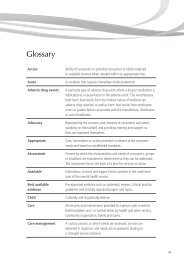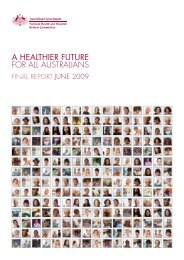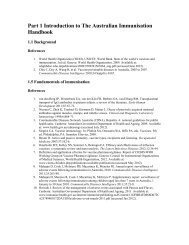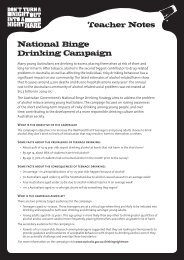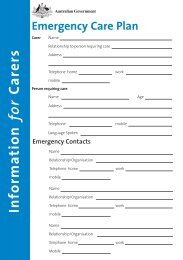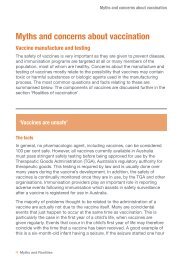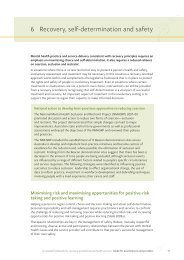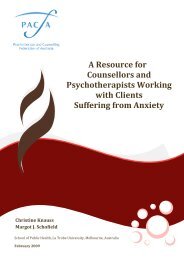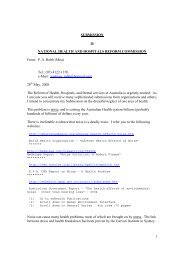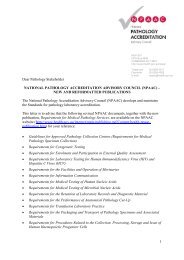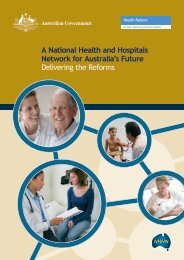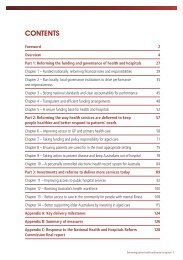PDF file - Department of Health and Ageing
PDF file - Department of Health and Ageing
PDF file - Department of Health and Ageing
You also want an ePaper? Increase the reach of your titles
YUMPU automatically turns print PDFs into web optimized ePapers that Google loves.
Annual report Invasive pneumococcal disease in Australia, 2004<br />
via increased herd immunity. Although increases<br />
in disease caused by non-7vPCV serotypes have<br />
been seen, these have been small relative to the<br />
declines in 7vPCV serotype disease. It has been<br />
recently estimated that the universal 7vPCV will<br />
prevent more than 80 per cent <strong>of</strong> childhood IPD <strong>and</strong><br />
associated mortality in Australia. 7vPCV may also<br />
prevent 6 per cent <strong>of</strong> all pneumonia, 18 per cent <strong>of</strong><br />
radiographically-defi ned pneumonia, 6 per cent <strong>of</strong><br />
otitis media <strong>and</strong> 20–40 per cent <strong>of</strong> tympanostomy<br />
procedures in children under 5 years. 9 A reduction<br />
<strong>of</strong> 80 per cent may be a slight over-estimation, since<br />
IPD due to 7vPCV serotypes has accounted for only<br />
72–74 per cent <strong>of</strong> disease in children aged under<br />
2 years in recent years; nevertheless a signifi cant<br />
reduction is anticipated. An analysis <strong>of</strong> the impact<br />
<strong>of</strong> the fi rst year <strong>of</strong> the universal 7vPCV vaccination<br />
program on IPD in Australia will be provided in the<br />
next report.<br />
Recent studies have revealed high-risk groups for<br />
IPD who could benefi t from vaccination. A case control<br />
study in the USA identifi ed asthma in persons<br />
aged 2–49 years as an independent risk factor for<br />
IPD. 10 Another USA study estimated the increased<br />
risk <strong>of</strong> IPD for specifi c chronic diseases, controlling<br />
for age <strong>and</strong> race. 11 Relative risks (compared to<br />
healthy adults) were 5.8 for diabetes, 6.9 for chronic<br />
lung disease, 10.4 for chronic heart disease, 11.5 for<br />
alcohol abuse, 32.2 for solid cancer, 48.8 for HIV/<br />
AIDS <strong>and</strong> 52.2 for haematological cancers. These<br />
observations support the recommendations in the<br />
Australian Immunisation H<strong>and</strong>book that such highrisk<br />
groups receive the 23vPPV. 12<br />
The changing epidemiology <strong>of</strong> IPD in the era <strong>of</strong><br />
pneumococcal conjugate vaccines is the subject <strong>of</strong><br />
continuing research. Changes in serotypes causing<br />
IPD (‘serotype replacement’) are being measured<br />
through on-going laboratory surveillance. Despite<br />
increased prevalence <strong>of</strong> non-7vPCV serotypes in<br />
Indigenous children between 2001 <strong>and</strong> 2005, the<br />
overall rate <strong>of</strong> IPD continues to decline. Some concern<br />
has been raised about non-7vPCV serotypes<br />
causing unusual or severe presentations <strong>of</strong> IPD<br />
such as para-pneumonic empyema. 13 However, a<br />
recent review <strong>of</strong> apparent epidemiological differences<br />
between serotypes concluded that 7vPCV<br />
serotypes are the most prevalent in children aged<br />
6 months to 2 years <strong>and</strong> in the immunocompromised<br />
<strong>and</strong> elderly adults. Continued epidemiological surveillance<br />
is required to determine whether increases<br />
in the prevalence <strong>of</strong> some non-vaccine serotypes<br />
are more signifi cant than others. 14<br />
The use <strong>of</strong> 7vPCV in Indigenous children in Australia<br />
over the past three years has successfully reduced<br />
the rate <strong>of</strong> IPD to that <strong>of</strong> non-Indigenous children.<br />
There is, to date, no evidence <strong>of</strong> signifi cant non-<br />
7vPCV serotype ‘replacement’ disease. Rates <strong>of</strong><br />
pneumococcal resistance to penicillin are modest<br />
<strong>and</strong> resistance to ceftriaxone/cefotaxime remains<br />
rare. The introduction <strong>of</strong> the 7vPCV to the universal<br />
vaccination schedule in Australia in 2005 will further<br />
lower the disease burden <strong>of</strong> IPD among children<br />
<strong>and</strong> may contribute to reduction in other age<br />
groups. Continued enhanced IPD surveillance will<br />
be critical to assessing the impact <strong>of</strong> the exp<strong>and</strong>ing<br />
pneumococcal vaccine strategies.<br />
Acknowledgements<br />
The following laboratories are gratefully acknowledged<br />
for their support <strong>of</strong> Pneumococcal Laboratory<br />
Surveillance.<br />
ACT<br />
The Canberra Hospital<br />
New South Wales<br />
The Children’s Hospital, Westmead<br />
Central Coast Pathology<br />
Concord Hospital<br />
Douglass Hanley Moir<br />
Hunter Area Pathology<br />
Centre for Infectious Diseases <strong>and</strong> Microbiology,<br />
Institute <strong>of</strong> Clinical Pathology <strong>and</strong> Medical Research<br />
Laverty Pathology<br />
THE Pathology<br />
Nepean Hospital<br />
Pacifi c Laboratory Medicine Services<br />
Royal Prince Alfred Hospital<br />
South Eastern Area Laboratory Services<br />
St George Hospital<br />
St Vincent’s Hospital<br />
South West Area Pathology Services<br />
Sydney Adventist Hospital<br />
Wollongong Hospital<br />
Northern Territory<br />
Royal Darwin Hospital, <strong>Department</strong> <strong>of</strong> Microbiology<br />
Private laboratories in the Northern Territory<br />
Alice Springs Hospital <strong>Department</strong> <strong>of</strong> Microbiology<br />
Katherine Hospital <strong>Department</strong> <strong>of</strong> Microbiology<br />
Gove District Hospital<br />
Tennant Creek Hospital<br />
90 CDI Vol 30 No 1 2006



